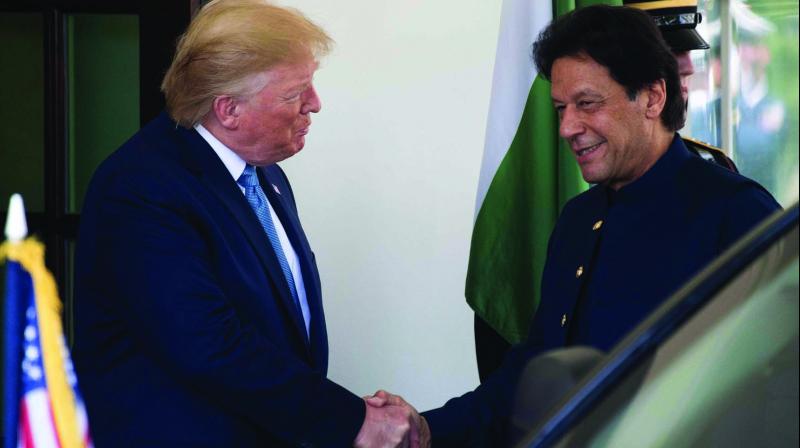Despite Trump's bonhomie towards Pak, India-US partnership is a long-term deal
Trump's foreign policy emphasis has been on selected areas China, the Middle East, North Korea and Afghanistan.

Last week in these columns I had analysed and predicted that Pakistan Prime Minister Imran Khan’s visit to Washington would probably essay yet another new turn in US-Pakistan relations. It came true and the Pakistani media was reasonably euphoric, although in a somewhat muted way. Much has been written in India about the turnaround in US-Pakistani relations, but there has been insufficient focus on why the United States under President Donald Trump is re-strategising and how long will such bonhomie last?
Mr Trump’s foreign policy emphasis has been on selected areas — China, the Middle East, North Korea and Afghanistan. Internally, the American economy may be looking up with a projected 3.1 per ecnt GDP growth and employment figures are improving. Trade ties with China have upset relations; the protracted trade dispute risks hindering growth. There are also no assurances arising from his meetings with North Korean leader Kim Jong-Un, who is determined to give away almost nothing. With the US elections just 15 months away, time is running out although Mr Trump now has reasonable approval ratings. There is nothing certain in the American elections, where Presidents are often elected by the barest of margins and it is for this reason that Mr Trump wishes to score some high-profile foreign policy successes. Economy and employment indices may sometimes be fickle, and the Robert Mueller Russia probe report still hangs fire. It’s a solid issue abroad that Mr Trump and his advisers are looking towards to cement the outcome of the 2020 election.
The decision to pull out of the Iran nuclear deal of 2015 has given no pluses because the progression towards any decided strategic advantage related to Iran has not been thought through. Brinkmanship and rhetoric can be more counter-productive when the same is not converted to real coercion. There are enough people in the US armed forces, the veterans’ community and the think tanks who can take apart national security adviser John Bolton’s approach of instigating a military showdown with Iran. The situation could turn out many shades worse than Iraq, with Iran prepared to fight the US in its own way and with its own strategy, through proxies galore. A prolonged unwinnable war is not going to make Mr Trump more popular or reinforce his chances of re-election.
That brings Afghanistan to the fore. With 12,000 American troops in Afghanistan and the situation unlikely to change in its favour, the US should be looking for eventual withdrawal. The question is whether after 18 years of fighting, should the US exit with no strategic advantage. The Taliban is not at all disposed towards acceding to any requests; no ceasefire, no acceptance of the national unity government in peace talks. It is talking at Doha only to smooth the process of taking over the reins and not disposed towards giving Mr Trump and his advisers any electoral advantage. No one is even talking about the future funding and the status of the Afghan National Army; a failure on both fronts would be sufficient to create a situation many times worse than that created by Syria’s civil war. Mr Trump knows that without Pakistan’s involvement now and subsequently in the post-withdrawal environment, there cannot even be a hope of some semblance of stabilisation. That is why Imran Khan is the most important personality for him now. This is the one foreign policy area which Mr Trump and advisers think is workable within the timeframe. Around 5,000 US troops could exit as a start point but some guarantees are required; and the Taliban isn’t giving any. So now Imran Khan is the new hope, and the preparation for this has been going on for some time with the IMF loan as a starter. The FATF decision will be next, and it is likely to favour Pakistan by keeping it on the grey list, and nothing more. Gen. Qamar Javed Bajwa, the Pakistan Army chief, was there with Imran Khan to do the serious chatting with Mr Trump’s advisers and place all the demands as a quid pro quo. Some sops prior to the meeting were given; the arrest of Hafiz Saeed and the opening of Pakistan’s airspace were the important ones, although the arrest of the Lashkar-e-Tayyaba founder and Jamaat-ud-Dawa chief is now more humour than anything else.
With India excluded from the high table on Afghanistan, what is disconcerting is that there seems total congruence between the interests of the United States, Russia, China and Pakistan. Not for nothing is Pakistan the core centre of the geopolitics of the region. For the US and Saudi Arabia, it is all about flanking Iran with a Sunni state and preventing the Taliban going completely astray or reneging on whatever few promises they make. The Russians do not want any of the turbulence arising from the end of the American odyssey in Afghanistan to travel to Central Asia and thence to Chechnya and Dagestan. They are all aware that the Islamic State (ISIS) is attempting to consolidate in Afghanistan and move towards Central Asia. China does not wish to see the region in any kind of instability because it’s here that the future of its Belt and Road Initiative assumes maximum importance.
With Pakistan almost akin to a being a future peacekeeper in this most crucial region of the world, its stakes are rising by the day. It’s a time that Pakistan can ask for a lot and the same could well be delivered or at least promised. Imran Khan is being praised lavishly for his diplomacy and critiqued for the handling of internal issues such as media freedom and coercion of political rivals. No one realises that it is the circumstances of the moment and the dynamics of the strategic environment at this juncture which has over the last few months turned completely in Pakistan’s favour, Imran Khan notwithstanding. How he handles Pakistan’s newfound significance, which isn’t the first time it is happening, will decide the future of India-Pakistan relations as well in the near future.
Has the US downgraded its relationship with India? Only the naïve would perceive that. The US knows who its long-term adversaries are. It has invested in India against precisely those threats. However, for now, the Indo-Pacific, where the real India-US relationship will play out, isn’t in the immediate run of issues of priority; it can therefore wait. It does not want an India-Pakistan military standoff either, as both are nuclear-armed countries; and nuclear risk is the last thing it wishes to have to deal with. President Trump, in his typical tactical ways, will kowtow even more to Pakistan, much to our chagrin. But eventually the US will return to India as the one solid entity through which it will optimise its long-term security needs.
